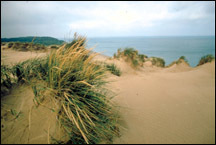
The University-National Park Energy Partnership Program (UNPEPP) has funded a joint project between the Notre Dame Energy Center and the National Park Service at Indiana Dunes National Lakeshore to provide energy related consulting services to the park during this coming summer.
During the course of the project, three undergraduate students from the University will work with park officials, conducting onsite research that will result in specific recommendations for capital improvement at the Indiana Dunes facilities.
According to Joan F. Brennecke, Keating-Crawford Professor of Chemical and Biomolecular Engineering and director of the Notre Dame Energy Center, the studentswork will focus on energy conservation and savings.
This is a wonderful opportunity for the students to put their training into practice in a real-world setting that encompasses project management skills, teamwork and leadership opportunities,she said.It also promotes discussion on a realistic and responsible use of resources.
As part of the project, students will be required to track and quantify the cost savingsand projected payback in terms of resources, such as energy use reduction and lower greenhouse gas emissionsrelating to their recommendations.
Participants in the 10-week project are Tom Furlong, a junior studying aerospace and mechanical engineering; Brian Klein, a senior political science major; and Jackie Mirandola Mullen, a sophomore pursuing degrees in German and history.
Among the projects the students are scheduled to complete during the summer program are energy audits of one-third of the Indiana Dunes National Lakeshore buildings, designs for a geothermal heat pump system for the Paul H. Douglas Center for Environmental Education, designs for a grass roof system for Building 110 at the park headquarters, and the creation of educational materials for park guests that describe the proposed improvements and energy savings.
UNPEPP is a nationwide program that links universities with national parks to address energy issues within the parks. Through these partnerships, parks gain assistance with energy related issues, while students obtain problem-solving experience in the energy field. Since its inception in 1997, UNPEPP has funded numerous partnerships between universities and national parks. Funding typically ranges from $15,000 to $20,000 per project and is used to support students, and faculty and equipment purchases.
The Notre Dame Energy Center works to develop new technologies to meet the global energy challenge. Housed in the College of Engineering, the center focuses on five areas of expertise: energy efficiency, safe nuclear waste storage, clean coal utilization, carbon dioxide separation, and storage and renewable resources. The center, which was established in 2005, is also committed to playing key roles in energy education and literacy, the development of energy policy and the exploration of the ethical implications associated with energy.
_ Contact: Joan F. Brennecke, Keating-Crawford Professor of Chemical and Biomolecular Engineering and director, Notre Dame Energy Center, 574-631-5847,_ " jfb@nd.edu ":mailto:jfb@nd.edu
TopicID: 26928